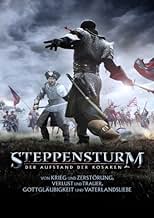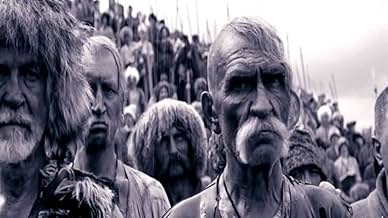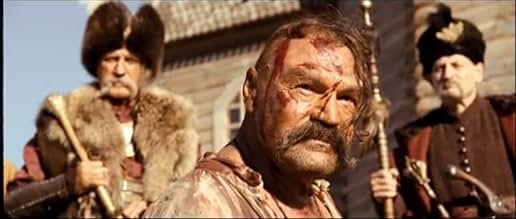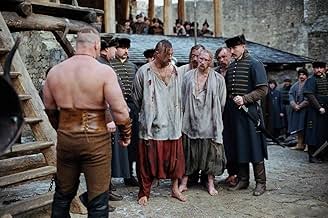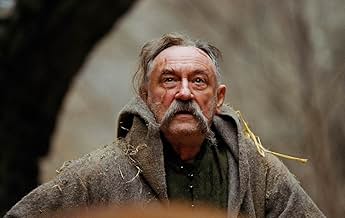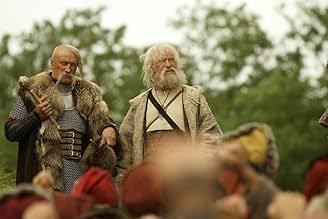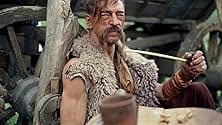IMDb RATING
5.7/10
3.6K
YOUR RATING
Set in the 16th century, this is a story about Ukraine's Cossack warriors and their campaign to defend their lands from the advancing Polish armies.Set in the 16th century, this is a story about Ukraine's Cossack warriors and their campaign to defend their lands from the advancing Polish armies.Set in the 16th century, this is a story about Ukraine's Cossack warriors and their campaign to defend their lands from the advancing Polish armies.
- Director
- Writers
- Stars
- Awards
- 5 wins & 3 nominations total
Yury Belyayev
- Koshevoy Kirdaga
- (as Yuriy Belyaev)
Sergey Bezrukov
- Narrator
- (voice)
Sergey Dreyden
- Yankel - the Jew
- (as Sergey Dontsov)
Alim Kouliev
- Cossack Moisei Shilo
- (English version)
- (voice)
Liubomiras Laucevicius
- Polish Duke
- (as Liubomiras Lauciavicius)
- Director
- Writers
- All cast & crew
- Production, box office & more at IMDbPro
Featured reviews
Unfortunately, this version of the great classic does not do it great justice. Bohdan Stupka's great performance does not elicit much response in either Vladimir Vdovichenkov as the brave Ostap or Igor Petrenko as the tragically star-struck Andrii. Partly, this looks like a poor script as the lines follow just too closely the original text of Gogol. Partly, this goes to the director's focus which was far more on the settings than dialogues, except when delivering propaganda one-liners a la Eisenstein or Dovzhenko.
Overall, this version of Taras Bulba seems just too much of an agitprop forthe new Cossack village creed of militant Russian patriotism and pride in martial traditions of the legendary steppe marauders which finds its natural outlet in heavy drinking and voting loyalty to Yedinaya Rossija.
Overall, this version of Taras Bulba seems just too much of an agitprop forthe new Cossack village creed of militant Russian patriotism and pride in martial traditions of the legendary steppe marauders which finds its natural outlet in heavy drinking and voting loyalty to Yedinaya Rossija.
I mostly agree with comments posted previously by other viewers, about the permanent propaganda-style used in longish and unrealistic patriotic speeches. I translated the movie into French and English subtitles to add on divx (they will be available soon on OS) and I got quickly bored by the seeming repetitiveness of several speeches. Beingmarried to a Ukrainian lady, I'm also very much aware that Bortko had to kinda "steal" the true story and replace it by Russian propaganda. Just have a look at who's at the steering wheel in Russia, now ! My feeling is that this movie was sponsored by Russian public funds for the "nashy" and their followers.
"May they all know what brotherhood means on Russian soil." The true account of Taras Bulba (Stupka), a Ukraine Cossack who helped to defend his homeland from the Poles in the 16th century. This is one of the best foreign movies that I have seen. The movie opens with a "Braveheart" like speech, then we flash back to what got him in that position. The movie then begins to take shape and tries to cover every conceivable aspect it can. Love story, fighting, father/son tension, and the quest for freedom. Much like as in "Saving Private Ryan" the movie is bookended by very intense fighting scenes. This is another movie that is not meant for queasy viewers. The torture scene toward the end makes the "Braveheart" one seem tame. There is so much in this movie and I could go on and on about the aspects of why I liked it, but it's best to just watch it and see for yourself. Very, very well done. Overall, a fantastic foreign movie that has some of the most intense battle scenes I have seen in a long time. I give it an A-.
Would I watch again? - I might, but not for awhile.
*Also try - Agora & Braveheart
Would I watch again? - I might, but not for awhile.
*Also try - Agora & Braveheart
.... And I guess that's the problem. Unabashed patriotism is OK for some, not for others. The Zaporozhians' battles in defence of Orthodoxy, when it was being attacked on two fronts, is a story that must not be forgotten. The film is impressive in its historical detail, costumes, etc.... the music (and some of the acting) is a little melodramatic, but I think it's a fitting thing for a rousing film. The scene of cossacks writing a letter to the Ottoman Sultan (an actual event from 1675) is reminiscent of the famous Repin painting depicting it. A grittier, less glam/swashbuckling version than the Yul Brynner classic, but that's what this story needs. It will never get wide theatrical release in North America because it is too honest, and not politically correct enough. Who cares. It's in my video collection, and it is becoming a favourite quickly.
Bortko set out to make an apparent epic here, but sadly, missed an opportunity to tell a great story. I researched Gogol before watching this film; the essence of the story is covered in the film's plot. What Gogol did NOT include was the Russian polemic which slaps you in the face at every turn in this film.
I agree with some of the other reviewers that casting and costuming were great! Fabulous actors, wonderful faces, but a sodden, leaden, boring script deprived them of a chance to display their true talent. Bogdan Stupka is always a pleasure to watch, and for a better version of these times, watch Hoffman's 1999 Polish epic "Ogniem i mieczem", in which Stupka plays Bogdan Khmelnitski.
The patriotic speeches, both in the sich and during the battle death scenes, slowed the movie to a dead crawl (no pun intended!) and greatly detracted from the film's impact. As others have noted, this is truly a Ukrainian story, not a Russian one. Ukraine was mentioned only twice in the movie (I counted). Endless speeches (particularly with a slit stomach) about the sacred Russian soil really have no place in a story about Polish/Ukrainian struggles, and only serve to underscore that the film's budget was heavily subsidized by the Russian government. At a time when the East and West need to work together to solve this world's problems, western xenophobia seems highly counterproductive. Such films only widen the divide and hurt us all as creatures of this planet.
One note about the score: nice idea again, but endlessly repetitious. I recognized in the main theme a variation of a famous Ukrainian carol "Novo radist stala", which I have sung many times, but it was extremely overdone. A little variation would have been nice. The repetitive score reminded me of another score for Bortko's "The Idiot", a wonderful Russian serial based on the Dostoevsky novel (2003). More endless repetition of the musical theme was the one negative in an otherwise flawless ensemble of actors and a compelling story.
In summary, this film was watchable but mostly boring. Some of the horrendously violent scenes made me cross myself. Not a total waste of two hours; however, it left me feeling that it could have been so much better with a little more effort and less propaganda.
I agree with some of the other reviewers that casting and costuming were great! Fabulous actors, wonderful faces, but a sodden, leaden, boring script deprived them of a chance to display their true talent. Bogdan Stupka is always a pleasure to watch, and for a better version of these times, watch Hoffman's 1999 Polish epic "Ogniem i mieczem", in which Stupka plays Bogdan Khmelnitski.
The patriotic speeches, both in the sich and during the battle death scenes, slowed the movie to a dead crawl (no pun intended!) and greatly detracted from the film's impact. As others have noted, this is truly a Ukrainian story, not a Russian one. Ukraine was mentioned only twice in the movie (I counted). Endless speeches (particularly with a slit stomach) about the sacred Russian soil really have no place in a story about Polish/Ukrainian struggles, and only serve to underscore that the film's budget was heavily subsidized by the Russian government. At a time when the East and West need to work together to solve this world's problems, western xenophobia seems highly counterproductive. Such films only widen the divide and hurt us all as creatures of this planet.
One note about the score: nice idea again, but endlessly repetitious. I recognized in the main theme a variation of a famous Ukrainian carol "Novo radist stala", which I have sung many times, but it was extremely overdone. A little variation would have been nice. The repetitive score reminded me of another score for Bortko's "The Idiot", a wonderful Russian serial based on the Dostoevsky novel (2003). More endless repetition of the musical theme was the one negative in an otherwise flawless ensemble of actors and a compelling story.
In summary, this film was watchable but mostly boring. Some of the horrendously violent scenes made me cross myself. Not a total waste of two hours; however, it left me feeling that it could have been so much better with a little more effort and less propaganda.
Did you know
- Trivia150 horses were used in the film.
- GoofsOn two occasions, it is raining in spite of the day clearly being sunny.
- Alternate versions"Veer" (2010)
- ConnectionsReferenced in Zloy gorod (2025)
- How long is Taras Bulba?Powered by Alexa
Details
Box office
- Budget
- $15,700,000 (estimated)
- Gross worldwide
- $18,888,220
- Runtime
- 2h 11m(131 min)
- Color
Contribute to this page
Suggest an edit or add missing content


